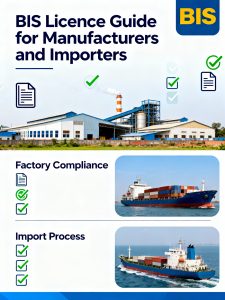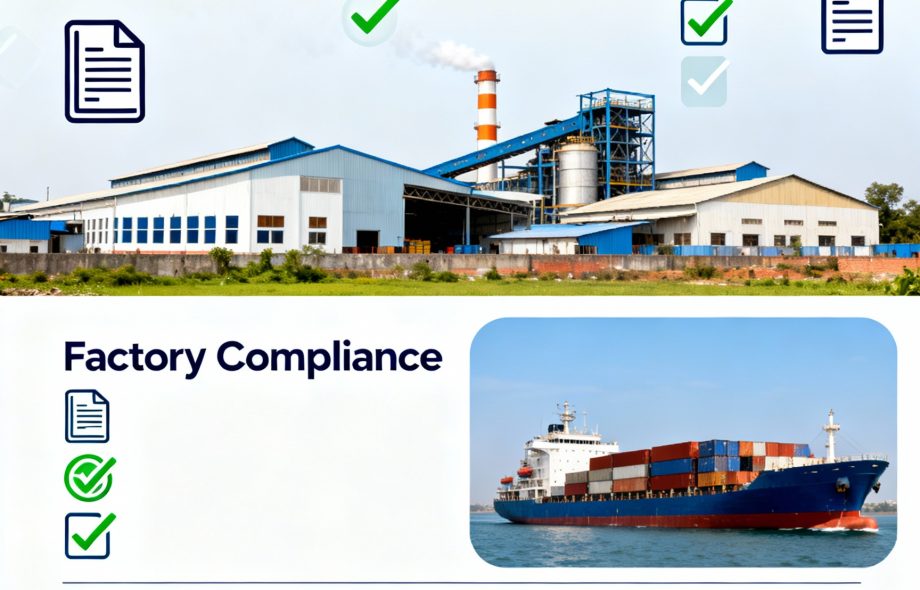
What is the “BIS licence” anyway
In simple terms the “licence” refers to a licence granted under Section 13 of the BIS Act, 2016 for using a specified standard mark in relation to any goods or article that conforms to Indian standards.
The authority behind this is the Bureau of Indian Standards, or BIS.
So when someone says they have a BIS licence for a product that means they have been authorised by BIS to use the Standard Mark (for example the ISI mark) on that product, indicating that the product meets a given Indian standard.
Why does it matter
If you manufacture or import certain products into India, and you place them on the market here, you may be required by law or regulation to have this licence (or registration) so that your product bears the standard mark.
Why? Because BIS sets the national standards (Indian Standards = IS) for products, consumer safety, reliability, health and so on.
BIS
If you skip this step you could run into enforcement problems: the product could be seized, you could face penalties, you could be asked to pull out of the market. (And yes—there have been recent actions by BIS against non-compliant imports).
But there is another side: having a BIS licence also signals to your customers and partners that you are serious about standards. It gives a kind of trust factor. For many buyers (especially business-to-business) it matters. It adds cost, process, but also value.
The schemes and how they work
Here is where things get interesting—there is not one “BIS licence” process but several schemes depending on the type of product, where it is made (India or outside), and whether certification is voluntary or mandatory.
Compulsory vs voluntary
For many product categories the government has mandated that they must comply with BIS standards and carry the standard mark. For instance BIS states that for certain products the certification is mandatory under its product-certification schemes.
For many other products the certification is voluntary—so you could choose to obtain it even if not required. Some manufacturers do this to gain competitive advantage.
Aleph INDIA®
Domestic Manufacturer Certification Scheme
If you are manufacturing in India and your product falls under mandatory certification or you choose to get voluntary certification, you apply under the domestic scheme.
Aleph INDIA®
Foreign Manufacturer Certification Scheme (FMCS)
If your manufacturing is outside India and you want to sell into India (or import your own product) you may have to apply under the FMCS to get the licence, appoint an authorised Indian representative etc.
Compulsory Registration Scheme (CRS)
For many electronic and IT products, the BIS introduced a registration scheme (rather than full certification) where the manufacturer (or importer) must register with BIS, submit test reports, mark the product appropriately, etc.
Validity and renewal
The BIS certificate/licence is not forever (unless conditions apply). For example some sources say validity is 2 years, and renewal periods vary by product and conditions.
A story from the field
I recall working with a small manufacturer in Gurugram who made household electrical fans. They were selling in local markets, and an order came from a chain store that required BIS registration/licence. They had never thought of that because they were making locally and selling locally. But the chain store’s procurement policy said the fan must carry the ISI mark (the standard mark issued by BIS). So we sat down, worked out which standard applied (for fans), got sample testing done in a BIS-recognised lab, prepared the documentation, arranged the factory inspection, paid the fees—and yes they obtained the licence. The extra cost and time was meaningful (two-three months, some investment) but once done they not only satisfied the buyer, they also used it as a marketing point: “Premium quality ISI certified fan”. It opened doors to bigger customers, allowed them to move into national distribution.
From that I realised: the licence is not just a compliance burden—it can shift how you think about your manufacturing process, your quality systems, your documentation, your factory discipline. It forces you to raise your game.
Some practical things you should keep in mind
Step one: identify whether your product is among those listed for compulsory certification or registration under BIS. The list changes over time.
Step two: determine which scheme applies (domestic, FMCS, CRS etc).
Step three: get your product tested in a BIS-recognised laboratory as per the Indian Standard for that product. Without test reports you cannot apply.
Step four: prepare documentation: manufacturing premises details, process flow, equipment list, in-house testing capabilities (if any), etc.
Step five: apply to BIS (or through the online portal) for the licence or registration, undergo inspection, submit results, pay fees.
Step six: once licence is granted you must mark the product with the standard mark (ISI mark or other BIS mark). And you must maintain compliance—surveillance by BIS may happen.
Step seven: make renewal and surveillance part of your plan. Don’t treat the licence as a one-time event.
What many get wrong
Thinking it is optional just because they are small: If your product falls under the mandatory list (even if you are small), ignorance is not a defence.
Thinking one licence covers all models: Often each model/brand may need separate inclusion or registration.
Forgetting surveillance and renewal: Some manufacturers get the licence and then drift. A factory visit or surprise audit can lead to suspension.
Underestimating the cost/time: The process will cost lab testing fees, inspection cost, possible upgrades to test equipment, documentation effort—and time.
Assuming imported products avoid this: Not so. For imports the FMCS/CRS as applicable still apply.
Does it make sense to choose to go for BIS even when not mandatory
Yes—there are business reasons. If you are targeting national distribution, large retailers, exports (to India market) then having a BIS licence sends a signal of quality. It may help you negotiate better prices, stand out from competitors, reduce buyer resistance. It becomes part of your branding. If you are working with international buyers they often ask “Does your product have BIS certification?” Because they know in India that mark counts.
A caveat and some future-watch items
One caveat: Having a BIS licence does not guarantee your product will never fail or never be recalled. It simply means that at the time of certification you met the standard and BIS has authorised the use of the mark. You still must maintain practices, quality control, avoid cheaper shortcuts.
Also, the list of products under mandatory certification/registration is expanding. For example, recent reports suggest that items like furniture and footwear may move under BIS mandates.
The Times of India
So staying updated matters.
Final thoughts
If I were advising someone today who is thinking of launching a manufacturing business (or import business) in India I would say: treat the BIS licence not as just a “check-the-box” item but as part of a quality culture. It demands you pay attention to standards, documentation, testing, continual improvement. If done right it can shield you from regulatory risk, position you for growth, open doors to bigger buyers.
It will cost you effort. It may mean you need to invest in better processes. But I believe the payoff is worth it—both in risk mitigation and in building credibility. For many of the businesses I have seen succeed, the turning point was when they stopped viewing BIS as a “regulation burden” and started viewing it as “my product is now recognised as meeting national standard”.
 :
https://eikomp.com/bis-license/
:
https://eikomp.com/bis-license/

